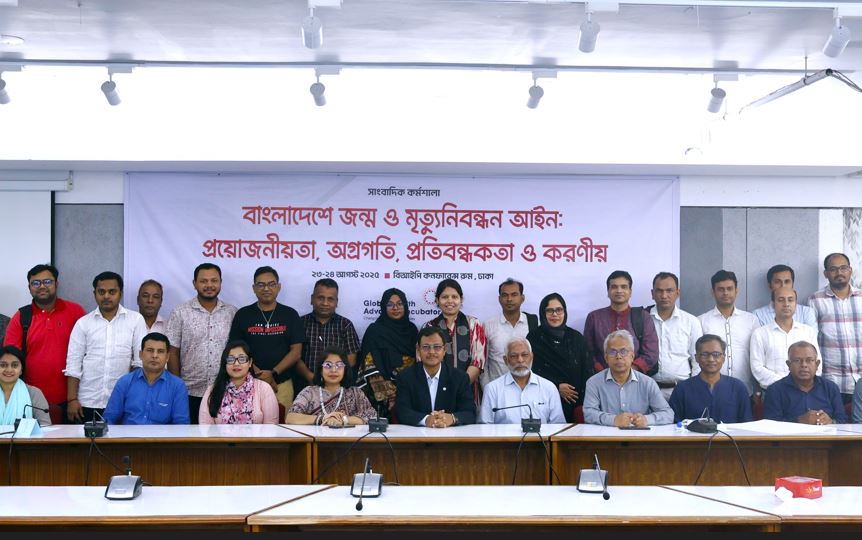News Flash

DHAKA, Aug 24, 2025 (BSS) - Amending and strengthening the existing law is crucial for ensuring universal birth and death registration in Bangladesh, experts said at a two-day workshop held in the city.
The event, titled "Birth and Death Registration in Bangladesh: Progress, Challenges and Way Forward", took place on August 23-24 at the BIP Conference Room and was organized by PROGGA (Knowledge for Progress) with support from the Global Health Advocacy Incubator (GHAI).
Thirty journalists from print, television and online media participated in the workshop.
Bangladesh, as an active member of the UNESCAP-led Civil Registration and Vital Statistics (CRVS) Decade initiative, has committed to achieving 100% birth and death registration by 2030.
This goal aligns with Sustainable Development Goal (SDG) 16.9, which prioritizes providing legal identity for all, including birth registration.
Despite this commitment, the country's current registration rates remain significantly low. Data presented at the workshop revealed that only 50% of births and 47% of deaths are registered in Bangladesh.
In comparison, UNICEF data from 2024 shows the global average birth registration rate at 77%, while the South Asian average stands at 76%. For death registration, the global average is 74%.
Speakers emphasized that birth and death registrations are critical for both individuals and the nation.
For individuals, registration ensures access to fundamental rights such as citizenship, education, healthcare, inheritance, and voting.
For the state, accurate demographic data is essential for policy planning, budgeting, and public service delivery.
A key issue discussed was the legal framework that currently places the burden of registration on families, despite the fact that 67% of births in Bangladesh occur in healthcare facilities.
Under existing law, hospitals are not authorized to directly register births and deaths.
Participants noted that global evidence shows registration rates significantly increase when healthcare institutions, rather than individuals, are made responsible for registration.
"Assigning the responsibility of birth and death registration to health facilities through law amendment will enable Bangladesh to achieve universal (100%) birth and death registration by 2030," said Muhammad Ruhul Quddus, Bangladesh Country Lead of GHAI.
Discussants highlighted several barriers impeding progress, including lack of public awareness, procedural complexities, technical limitations and poor coordination between government departments, especially with the health sector.
They urged the government to amend the Birth and Death Registration Act, 2004, to mandate that both public and private hospitals, clinics, and healthcare facilities register all births and deaths occurring within their institutions.
Participants included Md. Nazrul Islam and Md. Moyeen Uddin, Country Coordinators from Vital Strategies; Mir Masrur Zaman, Senior News Editor at Channel I; Mortuza Haider Liton, Convener of the Anti-Tobacco Media Alliance (ATMA); Nadira Kiron and Mizan Chowdhury, Co-conveners of ATMA and ABM Zubair, Executive Director of PROGGA.
Md. Hasan Shahriar, Head of Programs at PROGGA, and Mashiat Abedin, Coordinator, also delivered detailed presentations.
Speakers unanimously agreed that a legal mandate for health facilities to report and register births and deaths could be a game-changer for Bangladesh, helping the nation meet its international commitments and improve governance through better vital statistics.